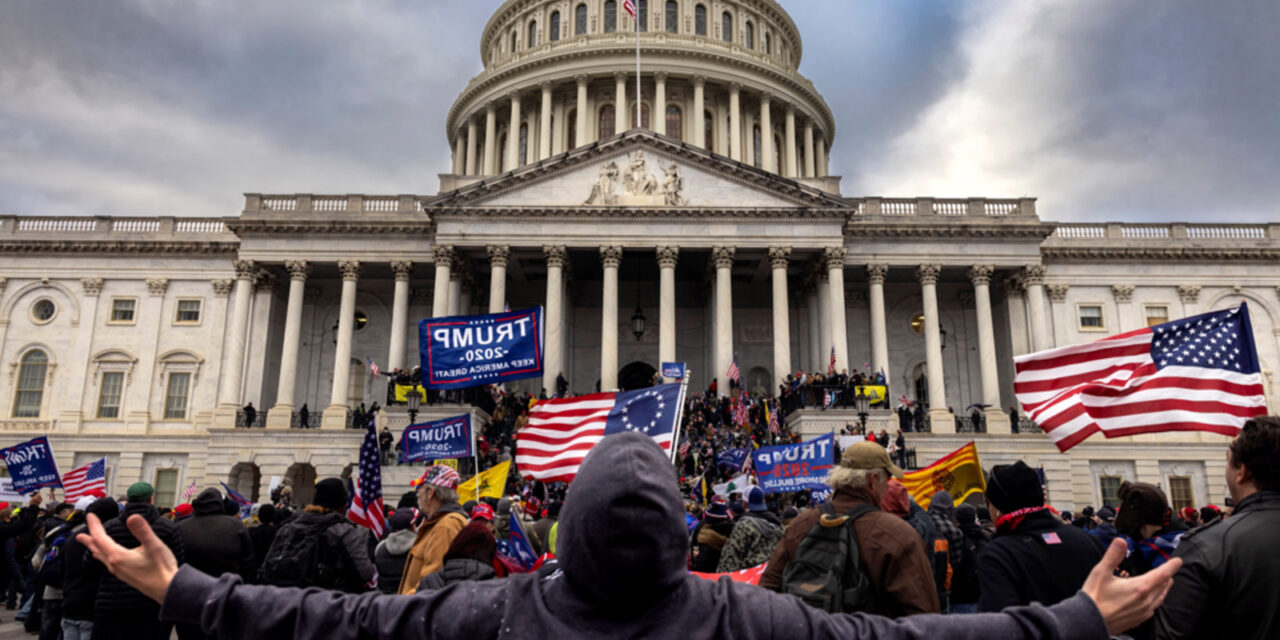This is my second blog about the rare crime known as Insurrection. On January 11, 2021, I blogged about abstract words too-often used to explain the infamous federal crimes committed at the U.S. Capitol on January 6, 2021. That blog focused on related words—Coup D’état, Insurrection, Sedition or Treason. Today’s blog is an update, given the remarkable fact that this DOJ has rarely charged anyone with Criminal Insurrection. For context, I’ll repeat a few of the elementary facts that precede charging someone with such a heinous crime.
Insurrection is addressed in U.S. Code, Title 18, Code Section 2383. It is illegal to incite, assist with, or participate in a rebellion or insurrection against U.S. laws and authority. The punishment includes a fine, up to ten years in federal prison and ineligibility for public office. It is not illegal to peacefully protest—in fact, peaceful protest is protected by the Constitution. But when protest elevates to violence and destruction, constitutional protection is lost. The crime of Insurrection can only be brought by the Office of the Attorney General of the United States. It is extremely rare for good reason. It requires the government to prove beyond a reasonable doubt that the defendant committed an act or instance of revolting against civil authority. The essential meaning of Insurrection is a violent attempt to take control of a government.
The federal crime Seditious Conspiracy is addressed in U.S. Code, Title 18, Section 2384. “If two or more persons in any State or Territory, or in any place subject to the jurisdiction of the United States, conspire to overthrow, put down, or to destroy by force the Government of the United States, or to levy war against them, or to oppose by force the authority thereof, or by force to prevent, hinder, or delay the execution of any law of the United States, or by force to seize, take, or possess any property of the United States contrary to the authority thereof, they shall each be fined or imprisoned not more than 20 years, or both.”[1] This crime is more serious than Insurrection, easier to prove and carries a longer prison term. It is frequently used in federal prosecutions against far-right groups, including far-right militias for their participation in the January 6 United States Capitol attack.[2]
So, are the ethical norms different between these two crimes—one commonly used and the other rarely even filed? If so, why? Both federal crimes involve federal officers. Both were committed on federal grounds—the U.S. Capitol, the Federal Ellipse, and the White House. Both were captured on tape, film, digitally, and imbedded in the memories on hundreds on the ground, thousands in the vicinity, and tens of millions worldwide. There is no doubt about what happened. And there is little doubt about who instigated, promoted, and reveled in the violence committed that day. Trump did. This blog is not about the January 6 crimes, charges, or convictions; it is about the ethics of the thing.
The vast majority of Americans, irrespective of party, say Trump’s behavior, acts and failure to act were unethical on January 6. “According to a new poll, 79% of Americans believe that Donald Trump’s actions . . . were illegal or unethical. Just 21% think that he did nothing wrong . . . At the same time, a public consensus has emerged that former President Donald Trump acted at least unethically in trying to hold on to his office after the 2020 election. 79% feel he acted either unethically or illegally, including 45% who believe his actions were illegal, that he encouraged political violence in his public statements ahead of January 6 (61%) and that he could have done more to stop the attack once it had begun (77%). All told, the poll finds that 69% of Americans consider the January 6 attack to be a crisis or major problem for American democracy. That’s up slightly since earlier this year, when 65% said the same. More broadly, 54% say they see American democracy as under attack, about the same as the 52% who felt that way earlier this year.”[3]
The preamble to the Constitution confirms that the purpose of government cannot be achieved without an ethical framework. That foundational document makes ethics a critical component of public administration. Why do we have a code of ethics applicable to government and public administration? We have it because nearly all of us learn ethics at an early age. We learn right from wrong from parents, teachers, community leaders, politicians, and entertainment and news media. Ethics permeates every facet of life—from decision-making at work to how people handle personal relationships.[4]
- The decisions, choices, actions, and behaviors we make reflect and enact our values.
- The study of what we understand to be good and right behavior and how people make those judgments.
- A set of standards of conduct that guide decisions and actions based on duties derived from core values.
- The discipline dealing with what is good and bad and with moral duty and obligation.
- Decisions, choices, and actions we make that reflect and enact our values.
- A set of moral principles or values.
- A theory or system of moral values.
- A guiding philosophy.
The White House has a formal, written Code of Ethics. As of January 20, 2021, it required all appointees across the Federal Government to sign a stringent ethics code.[5] It bears a grand title, “Executive Order on Ethics Commitments by Executive Branch Personnel, and is signed by President Joseph R. Biden, Jr. He said, “I recognize that this pledge is part of a broader ethics in government plan designed to restore and maintain public trust in government, and I commit myself to conduct consistent with that plan. I commit to decision-making on the merits and exclusively in the public interest, without regard to private gain or personal benefit. I commit to conduct that upholds the independence of law enforcement and precludes improper interference with investigative or prosecutorial decisions of the Department of Justice. I commit to ethical choices of post-Government employment that do not raise the appearance that I have used my Government service for private gain, including by using confidential information acquired and relationships established for the benefit of future clients.”
President Biden’s commitment to ethics in the White House identifies scores of individual and institutional commitments to ethical conduct in virtually every aspect of governance and personal commitment.
President Trump signed his Executive Order on Ethics four years earlier, on January 28,2017. It is mirror-copy, word-for-word identical to the executive ethics orders by Presidents Clinton and Obama. In it, trump lifted a federal order from earlier Democratic presidents. but those are presidents he condemned for not ‘draining the swamp.’ Professor John Woolley is co-director of the Presidency Project. He said, “The story here is not the copying per se, it is the claim Trump has been making that he is doing something really different, new, and righteous when, apparently, in many respects he is actually copying Democratic presidents he so thoroughly condemned as corrupt for not draining the swamp.”[6]
Ethics in the Trump era is AWOL. “At a minimum, Trump stretches the truth. Some would say he lied in the State of the Union speech when he said: ‘I have also made an ironclad pledge to American families: We will always protect patients with preexisting conditions.’ The Trump administration has been trying to undermine this provision. He also tends to use exaggerated language when praising his own actions like he did when he characterized the phone call with Ukrainian President Zelensky as ‘perfect.’ As for kindness, let’s not forget that during the 2016 Presidential election, he called Senator John McCain a loser because he was captured by the North Vietnamese. These are unkind words that lack empathy for someone who spent 5 ½ years as a prisoner of war, is considered to be a war hero and admired by millions of Americans. Trump’s feud with McCain started in 2015 after McCain commented that Trump had “fired up the crazies” at a campaign rally. Rather than take the moral high road, Trump lashed out because McCain didn’t support him.”[7]
One of this country’s most respected voices is the Markkula Center for Applied Ethics at Santa Clara University. They wrote at length about the consequences of Trump’s unethical leadership and his followship. “The United States has been witness to four years of Donald Trump’s erratic, self-serving, and unethical leadership. Many have objected to his leadership style as unbecoming of an individual who serves as President of the country. But large numbers of citizens and leaders have embraced, tolerated, or enabled even the lowest of his low behavior. And millions voted for his reelection. The consequences of Trump’s rhetoric and his followers’ actions manifested themselves in the nation’s capital on January 6, 2021. An insurrection, fomented by the president of our country, led to an attack on our elected representatives in Congress as they performed their constitutionally directed duty to review the certified votes of the Electoral College. This was an attempted coup of a legitimately elected president. In normal times—times when ethical norms are adhered to—these acts by a violent mob would have been met with condemnation by all leaders who respect the constitution and rule of law. But not in these times.”[8]
Arguably, conflicts of interest are the most loathsome form of unethical conduct in governance. Citizens For Ethics.org posted an exhaustive list of Trump’s stunning ignorance of elementary rules of ethics. “Next week marks the end of Donald Trump’s term as President. In his wake, he will leave behind a legacy of profound corruption and egregious conflicts of interest, the repercussions of which will echo for years after he is gone. In the last four years, Trump has flouted all kinds of norms set by previous presidents, starting with his decision not to divest from his business interests while in office, setting the stage for what became an administration marked by placing self-interest and profiteering at the highest levels above the public interest and culminated in a deadly insurrection that was rooted in the same self-serving ethos. Trump ran as the “law and order” candidate who would “drain the swamp” in Washington, D.C. Instead, he did the opposite, using his power as the President to boost his own profits through frequent visits to his hotels and golf courses, relentless promotion of his properties, and countless other interactions between the Trump Organization and the government. By keeping these properties, Trump provided corporate lobbyists, foreign actors, special interests, and anyone else seeking political clout a way to gain access to his administration. Trump opened the presidency up for business, and for four years, influence was for sale. . . There are likely hundreds, perhaps even thousands more conflicts that we have no way of knowing about. Four years and more than 3,700 conflicts of interest later, there is absolutely no doubt that Trump tried at every turn to use the presidency to benefit his bottom line.”[9]
Trump’s unethical conduct is a shared vice. “The violent insurrection at the U.S. Capitol Building last week, incited by President Donald Trump, serves as the grimmest moment in one of the darkest chapters in the nation’s history. Yet the rioters’ actions—and Trump’s own role in, and response to, them—come as little surprise to many, particularly those who have been studying the president’s mental fitness and the psychology of his most ardent followers since he took office. . . The reasons are multiple and varied . . . [there are] two major emotional drives: narcissistic symbiosis and shared psychosis. Narcissistic symbiosis refers to the developmental wounds that make the leader-follower relationship magnetically attractive. The leader, hungry for adulation to compensate for an inner lack of self-worth, projects grandiose omnipotence—while the followers, rendered needy by societal stress or developmental injury, yearn for a parental figure. When such wounded individuals are given positions of power, they arouse similar pathology in the population that creates a “lock and key” relationship.”[10]
A post by JustSecurity.com on August 19, 2022, narrows the legal questions of criminal indictment while expanding the ethical questions. “The Justice Department’s current investigation of criminal efforts to overturn the results of the 2020 presidential election apparently is taking two paths. One investigative grand jury is considering “potential fraud associated with the false-electors scheme or with pressure Trump and his allies allegedly put on the Justice Department and others to falsely claim the election was rigged.” Another is focusing on “seditious conspiracy and conspiracy to obstruct a government proceeding, the type of charges already filed against individuals who stormed the Capitol on January 6.” The first grand jury is looking at nonviolent efforts to block the transfer of power; the second, at violent efforts.”[11]
Trump’s lack of ethics and unethical behavior are not criminal offenses. Insurrection is a criminal offense. It is clear he is unethical. It is unclear whether he is also an insurrectionist. It is clear that most Americans know he’s unethical. And it’s clear that most Americans want the perpetrators of the attack on our Capitol on January 6, indicted, charged, tried, found guilty, and sentenced to the maximin prison terms available under federal law. All that said, it is equally clear that more than 900 criminal cases have been filed against January 6 preparators for various crimes. But not a single one has been charged with Insurrection.
One key to understanding ethical questions surrounding Trump’s role in the January 6 attack is the ruling by a U.S. District Judge in civil cases against him arising out of the attack. Judge Amit. P. Mehta ruled that three civil lawsuits against Trump should move forward. He ruled, “The former president is not shielded by the normal protections of immunity or the First Amendment. The ruling means the plaintiffs, several members of Congress and police officers who served at the Capitol during the attack — will likely be able to seek information from Mr. Trump about the specific role he played in fostering the chaos at the building on Jan. 6, 2021.”[12]
While it’s always dangerous to predict the former president, it seems likely that the civil case will move forward whether or not the criminal case stalls at the Department of Justice. It seems to avoid clashes with Presidents by asserting criminal charges while indicting down-stream perpetrators by the hundreds. That policy is embedded in a DOJ policy inserted on October 16, 2000. “The indictment or criminal prosecution of a sitting President would unconstitutionally undermine the capacity of the executive branch to perform its constitutionally assigned functions.”[13] Actually, the October 2000 policy statement was a review of a 1973 Memorandum Opinion the DOJ’s Office of Legal Counsel issued regarding then President Nixon’s criminality in Watergate. It is a complicated construct arising out of language in the Impeachment Judgment Clause in the Constitution. “The Department concluded that neither the text nor the history of the Constitution ultimately provided dispositive guidance in determining whether a President is amenable to indictment or criminal prosecution while in office.”[14]
Given the precedent at the DOJ, caution and toe-stepping is warranted. But the ethical outcome is plain. Indicting a sitting president cannot inhibit the DOJ’s evaluation of whether to indict a former president. He is a former president. He is ethically unfit to ever serve in public office again.
[1] https://en.wikipedia.org/wiki/Seditious_conspiracy#:~:text=Seditious
[2]https://www.justice.gov/opa/pr/leader-oath-keepers-and-10-other-individuals-indicted-federal-court-seditious-conspiracy
[3] htthttps://onlinempa.unc.edu/blog/the-importance-of-ethics-in-public-administration/ps://jaxgay.com/newspolitics/nearly-80-think-trumps-actions-were-illegal-or-unethical-on-jan-6
[4] https://onlinempa.unc.edu/blog/the-importance-of-ethics-in-public-administration/
[5] https://www.whitehouse.gov/omb/information-for-agencies/ethics-pledges-and-waivers/
[6] https://www.npr.org/2017/01/28/512201631/trumps-executive-order-on-ethics-pulls-word-for-word-from-obama-clinton
[7] https://www.ethicssage.com/2020/02/ethics-in-the-era-of-trump.html
[8] https://www.scu.edu/ethics/all-about-ethics/the-consequences-of-unethical-leadership–and-followership/
[9] https://www.citizensforethics.org/reports-investigations/crew-reports/president-trump-legacy-corruption-3700-conflicts-interest/
[10] https://www.scientificamerican.com/article/the-shared-psychosis-of-donald-trump-and-his-loyalists/
[11] https://www.justsecurity.org/82713/seditious-conspiracy-vs-insurrection-assessing-the-evidence-against-trump/
[12] https://www.nytimes.com/2022/02/18/us/politics/civil-suits-trump-jan-6.html
[13] https://www.justice.gov/olc/opinion/sitting-president%E2%80%99s-amenability-indictment-and-criminal-prosecution
[14] Id at page 236 of op-olc-v024-p0222_0.pdf

I am an author and a part-time lawyer with a focus on ethics and professional discipline. I teach creative writing and ethics to law students at Arizona State University. Read my bio.
If you have an important story you want told, you can commission me to write it for you. Learn how.






 I am an author and a part-time lawyer with a focus on ethics and professional discipline. I teach creative writing and ethics to law students at Arizona State University.
I am an author and a part-time lawyer with a focus on ethics and professional discipline. I teach creative writing and ethics to law students at Arizona State University.  My latest novel is Hide & Be.
My latest novel is Hide & Be.  If you have an important story you want told, you can commission me to write it for you.
If you have an important story you want told, you can commission me to write it for you.